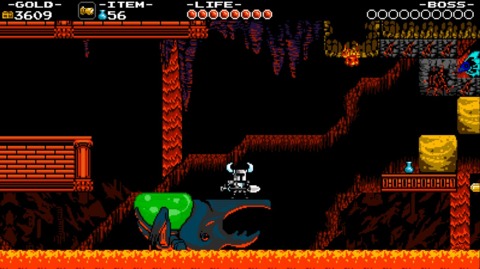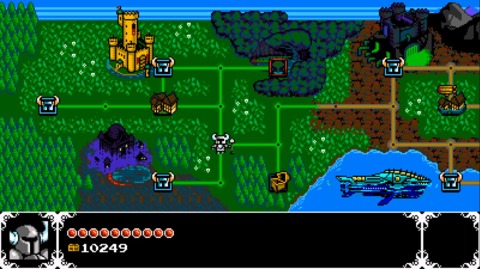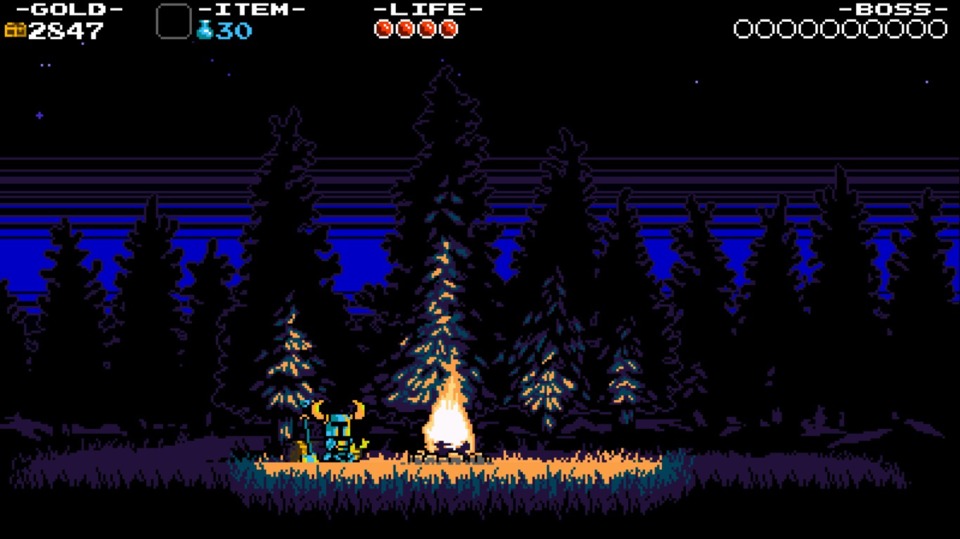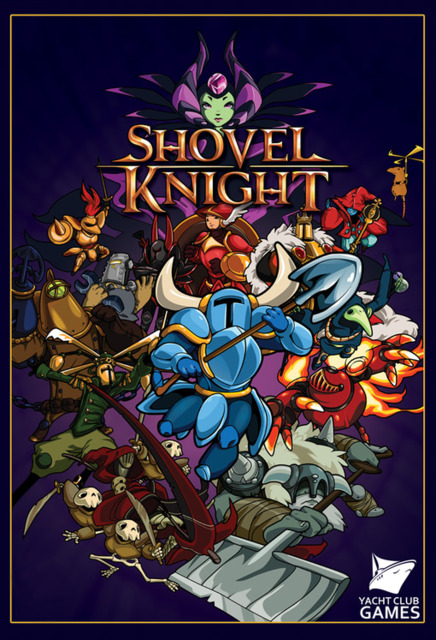A retro platformer that carefully attends to its roots.
It's hard to avoid the reality that the recent spate (and don't worry, that's as close as I'm getting to a shovel pun in this review) of "nostalgic" pixel-focused, 8-bit-reminiscent action games has all but rendered the format trite at this point. If that's the case then, at least for the time being, I'm happy to make Shovel Knight the retro genre's swansong. Though from all appearances it aspires to little more than creating a yesteryear classic that never was, it's far better suited to the task than otherwise perfectly exemplary peers like Oniken, Wizorb, Anodyne, Evoland, Mutant Mudds, Volgarr the Viking... did I mention there's been a few of these lately?
Shovel Knight's a chimera of NES classics, picking and choosing the most memorable and serviceable elements from the library of Nintendo's inaugural console in order to both hit the nostalgia nerve hard and to also ensure that the game has a solid foundation of platformer action to build from. The sub-weapons (called Relics in the game) immediately bring to mind Konami's Castlevania; the stage layouts borrow a lot from Capcom's Mega Man, especially the ominous final corridor before the stage's inevitable boss fight against one of the villainous Knights of the Order of No Quarter; the world map stretches out after every significant milestone to reveal more of what's to come, not unlike HAL's Kirby's Adventure; Shovel Knight frequently employs a downwards strike that aids in defeating enemies and passing over obstacles alike, similarly to the pogo-ing Scrooge McDuck of Capcom's DuckTales; the peaceful villages full of roaming NPCs and their hint-giving textboxes recalls Nintendo's Zelda II: The Adventure of Link, or Falcom's Faxanadu. Every one of these retro throwback games seems to contain a feast of little details for attentive NES nerds to pick apart, and it definitely helps lend to the illusion that Shovel Knight was a game of that era.

The pixel art is, of course, far too well-animated and lush to be truly 8-bit. The amount of detail that's gone into each enemy and NPC, from the way the large spear-wielding warriors in The Lost City stage wriggle their fingers in anticipation or when the supercilious gryphons of Pridemore Keep disdainfully swipe at the be-shovelled interloper in their midst, gives them all a very distinctive character that helps set them apart from each other and those like them from the games Shovel Knight was inspired by. The music, a chip-tune heavy assortment of catchy numbers that serve as a secondary collectible in-game, is uniformly excellent as well, having been overseen by WayForward's resident retro music expert Jake Kaufman with contributions from the inimitable Manami Matsumae, who has plenty of experience composing music for the Mega Man series.
The story of Shovel Knight is unusually poignant as well. Though Shovel Knight must simply defeat every henchman of the antagonistic Sorceress in order to proceed, he is wracked by guilt and dreams uneasily of his dearly departed Shield Knight, who disappeared before the game's events begin. It becomes fairly obvious in short order just what happened to her, but the little dream sequences that play between milestone events in which Shovel Knight has to catch Shield Knight as she falls despite being beset on all sides by enemies is a touching and gameplay congruous way to emphasize Shovel Knight's regret. Equally, his battles with the Proto Man-esque Black Knight provide just enough exposition to keep Shovel Knight's quest interesting without encumbering an impatient player with too much dialogue to click through. Other characters, like the bizarre Troupple (a trout/apple hybrid deity), the cameo-riffic "wandering warriors", the anthropomorphic townspeople, and the oddly specialized vendors like the Gastronomer and Magicist are all packed with eccentric charm and lighthearted bon mots. For as lonely as Shovel Knight is, he's surrounded by a rogue's gallery of oddballs.

The platforming gameplay of Shovel Knight is excellent, though largely perfunctory and clearly built on the NES games that have come before. There's nothing like the high speed insanity of Super Meat Boy or Dustforce, nor are there gimmicks aplenty like the foreground/background hopping of Mutant Mudds or Donkey Kong Country Returns. Shovel Knight keeps it deliberately simple, and deliberately precise, right down to the two-button NES controls. Shovel Knight can swing his shovel, which hurts enemies and repels/deflects most projectiles. He can pogo with a downward strike simply by hitting the down button while jumping, and he can activate a relic in his equipped slot with an up + attack command. The relics are a group of items that draw from a finite pool of mana but can make the game easier, either by attacking enemies at a distance -- an anchor works like Castlevania's axe, swinging up in an arc, and a fire wand shoots flames directly ahead of Shovel Knight to hit distant enemies -- or by giving Shovel Knight a means to reach greater distances, such as the Dust Knuckles or Propeller Knife. In addition, there's also the incredibly useful Phase Locket that renders Shovel Knight invincible for a very brief period, allowing him to cross over beds of spikes or temporarily avoid a damaging wave of desperation attacks from a boss. The relics need to be found by searching out secret areas and paying the opportunistic vendor Chester for them, and the core stages are always built in such a way that relics are never absolutely necessary (yet are often very useful all the same).
The difficulty curve of Shovel Knight is surprisingly gentle, at least compared to the more challenge-focused retro games of recent years. Though death is common and takes a harsh toll on Shovel Knight's funds, there's always a way to recover the money lost if the player can return to where Shovel Knight last fell. There's frequent checkpoints, and the relics can render many challenging platforming sequences trivial if the player wants nothing to do with beating those instances "the correct way". In addition, the player can acquire two chalices that allows Shovel Knight to carry full heals wherever he goes, making most boss battles as easy as the player wishes them to be. On the flipside, there's rewards to be gained for the truly skillful or daring: the checkpoints can be destroyed for money, which prevents them from ever being used as checkpoints again. There's types of armor that increases the damage incurred for the trade-off of having additional magic. The achievement system, called feats in-game, provide some exceedingly difficult goals to pursue for players looking for an extra challenge, such as beating the game without dying or eschewing any and all relics or health upgrades. The game's not lacking in challenge, but it wisely makes most of its difficulty peaks optional to allow players of a regular skill level to see everything the game has to offer. It's surprisingly refreshing, given how often these games lean strongly into making their trials as difficult as possible for the sake of "Nintendo Hard" verisimilitude.
Overall, Shovel Knight is a very well put-together package that hits all the right buttons as far as NES nostalgia goes, and is a very playable game in its own right as well. Though I have a handful of minor quibbles -- you can't exit a stage without undoing all progress, so there's no way to hop in for a collectible you missed and leave without defeating the boss again; the moneybags left behind after death frequently float beyond your grasp; the hit detection is a little off on some spikes and enemies; and one boss in particular makes the inevitable boss gauntlet a pain in the neck -- there's really nothing about Shovel Knight that would put off an interested party already drawn in by its look and nature. You know going in precisely what you're in for just from glancing at a few screenshots or a Youtube trailer, but perhaps you might not anticipate it being this solid.

